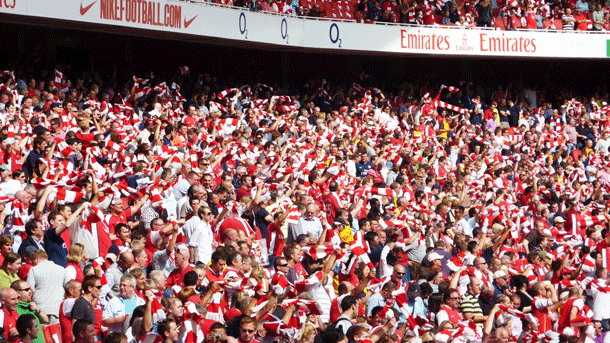
The internet can be a bad place to be a woman. While simply being online and female is at times enough to awaken the trolls, an especially rabid type of vitriol seems to be reserved for women who dare venture into territories traditionally dominated by men (see: #GamerGate. Or, you know, don’t, if you value your peace of mind.)
One such domain is football. From Twitter and Vine, to newspaper comment sections, to forums such as Red and White Kop (RAWK) of this world, football has really found its place on the internet. And judging by the widely shared, banteruously sexist World Cup memes, the sinister threats levelled at women who speak out on serious issues within the game, and everything in between, you could argue it is a place women would be wise to stay clear of.
And yet, as is often the case when it comes to the web, reality is not quite that black and white. As a female football fan myself, I feel lucky that my own encounters with overt sexism online have been few and far between. What I have seen plenty of, however, are deeply knowledgeable, funny and passionate football fans — who also just happen to be women.
When looking at social media activity during last summer’s World Cup, CNN found that national team support seemed pretty evenly matched between the sexes. "The additional attention that social media has given the sport offers women additional outlets to access the tournament that they may not have traditionally had,” explained sociology doctoral student Stacey Torres.
The internet has the possibility of supporting women and girls in their football fandom, Carrie Dunn, a journalist and academic who has done considerable research on female fans told me. It could offer them “the opportunity to engage with a fandom from which they're physically distant or excluded.”
That is a key part. The internet offers not only unprecedented possibilities to watch, listen to or otherwise follow games from all over the world, it makes coming across other women doing the same that much easier. A few years ago, I barely had any female friends who would be interested in hearing me complain about the dysfunction of La Liga. Today I know many, from all across the globe — and that is down to the likes of Twitter. It puts power into the hands of female fans to find their own place in football, on their own terms.
On the one hand, there is the opportunity to easily set up sites, platforms, accounts, groups, discussion boards, and full on movements aimed at, or reaching, a predominantly female audience. Organisations like Women in Football have become credible voices online and off in the fight against sexism in the game, and they’re using the web to help track instances of sexist discrimination. On the less serious end of the spectrum, sites like Tumblr, hugely popular with young women, have pages and pages dedicated to clubs and players, while even celebrity gossip blog Oh No They Didn’t! had numerous posts on the World Cup, garnering hundreds of comments.
These types of sites tend to be looked down upon, as if their content is somehow less valid than male fans’ ongoing obsession with footballer’s facial hair, or mainstream sport outlets’ dissection of the relationship between Jose Mourinho and Louis van Gaal. “It isn't as different as you might think,” says Kelly Welles, who runs the website of popular podcast The Football Ramble. She used to write for the now-defunct Kickette.com, a 2012 Cosmo blog award winner which attracted predominantly female audience.
“They came to us for properly researched and presented news, information and editorial that was what they got,” she says of Kickette’s established following. “Their knowledge base was staggering, not just about Premier League football, but across the major European leagues, South American football, Australia and Asia. It was a steep learning curve for me, but the lessons I learned there were immediately translatable at the Ramble.”
But perhaps more importantly, through the internet women are also becoming more visible in “mainstream” (still to an extent code for “male-dominated”) sphere of football fandom.
Late last year, the Guardian and Observer’s Amy Lawrence was named the Football Supporters Federation Writer of the Year. As a contributor to the Guardian’s Football Weekly podcast, and with a popular Twitter presence to supplement her excellent reporting, she beat an otherwise all-male shortlist, in an award voted for by thousands of fans. “I couldn’t be prouder, I classify myself primary as a football fan,” she said at the time.
Beyond established names like Lawrence, there’s a whole host of female fans from all around the world finding their place in — and as a result expanding — football’s online ecosystem. Young British blogger Anna-Louise Adams, whose writing on everything from sexism to non-league football, has won the praise of industry insiders and fans alike.
 Ash Hashim, based in Asia, is behind the Futbolita site, covering football and fan cultures in Europe and Latin America. Barcelona fan and blogger Linda H, based in New Zealand, has produced possibly the clearest breakdown to date of her club’s current transfer ban. And it’s not just writing. From Croatia, Anita Sambol creates and shares popular graphics based around her club Arsenal.
Ash Hashim, based in Asia, is behind the Futbolita site, covering football and fan cultures in Europe and Latin America. Barcelona fan and blogger Linda H, based in New Zealand, has produced possibly the clearest breakdown to date of her club’s current transfer ban. And it’s not just writing. From Croatia, Anita Sambol creates and shares popular graphics based around her club Arsenal.
“Internet and social media were crucial for me as an Arsenal fan,” she says. She grew up in small village, with few other football fans and no Premier League on TV. Even now, living in a bigger city, she doesn’t know many “real life” Arsenal fans. The internet is her go-to place to watch and discuss games. “Since I'm into graphic design, social media helped making my Arsenal-related works available to people from all around the world. It offered me lots of new opportunities and I made many friends among Gooners worldwide,” she adds.
Meanwhile, all-female football podcast The Offside Rule (We Get It!) recently celebrated its second birthday. “We rely on the internet so much,” explains presenter and co-founder Kait Borsay (Full disclosure: I work with the podcast.)
“The Offside Rule (We Get It!) is first and foremost a podcast — downloadable via iTunes or available to listen via Audioboom. None of that would be possible without the right technology. Twitter, particularly, is important for our audience. When you're broadcasting something that's not on mainstream TV, or is independent of any larger publication or production you need all the help you can get with exposure.”

Beyond the three women you can hear on the podcast, every part of the growing project has women working behind the scenes. “Giving women and girls a voice is so important, the whole production, from social media to blogging on our website supports women either trying to get into the industry or who just want an outlet to express their love of the game. That's really important to us.”
All this is not to say that the online football fandom is a wonderful haven of diversity and equality — far from it. Carrie Dunn rightly points out that research has shown some female football fans conceal their gender online, to stop any possible negative repercussions. “Being an active football fan online and making one's femaleness obvious in one's online avatar/handle seems to mean that one's femaleness is foregrounded and thus you are ‘woman’ before anything else — and a target for whatever sexist/sexual abuse comes your way,” she adds.
From my own experience, the community the internet offers female fans can be a powerful supportive tool. When I’ve faced football-related sexism online, both women and men have been quick to stand up for me. I’ve done the same for other women. Yes, it can be utterly depressing to time and time again come across people who genuinely seem to believe banter should be a catch-all defence for bigotry, and recycle the same tired jokes about kitchens and sandwiches when faced with a woman saying something they don't agree with. But on the flip-side, the internet also allows you to see, clearer than before, the number of people — men and women — who consistently speak out against sexism in the game. It gives me hope that, at the very least, we’re going in the right direction. As Welles put it: “I feel like we're moving towards a meritocracy now where a consistent, informed, interesting take on football stands a chance of being heard, regardless of the producer's gender.”